Log in
Search
Latest topics
» Cox films/videos...by Coxfledgling Today at 4:46 am
» Purchased the last of any bult engines from Ken Enya
by Coxfledgling Today at 4:18 am
» My N-1R build log
by roddie Today at 12:32 am
» Happy 77th birthday Andrew!
by akjgardner Today at 12:27 am
» TEE DEE Having issues
by TD ABUSER Yesterday at 9:43 pm
» Landing-gear tips
by roddie Yesterday at 6:17 pm
» Roger Harris revisited
by TD ABUSER Yesterday at 2:13 pm
» Tee Dee .020 combat model
by Ken Cook Yesterday at 1:41 pm
» Retail price mark-up.. how much is enough?
by Ken Cook Yesterday at 1:37 pm
» My latest doodle...
by roddie Yesterday at 10:43 am
» Chocolate chip cookie dough.........
by roddie Fri Nov 22, 2024 1:13 pm
» Free Flight Radio Assist
by rdw777 Fri Nov 22, 2024 9:24 am
Cox Engine of The Month
Narrowing engine bearers
Page 1 of 1
 Narrowing engine bearers
Narrowing engine bearers
I've come across something that I don't know how to do. I am removing the Fox .10 POS off of my Jr. Ringmaster and replacing it with a TD .09.
The bearers will have to be narrowed to allow the .09 to bolt in. I really don't want to have to remove the doublers and screw up the dope. That's the only way I can think of doing it.
Has anyone gone down this road?
Ron
The bearers will have to be narrowed to allow the .09 to bolt in. I really don't want to have to remove the doublers and screw up the dope. That's the only way I can think of doing it.
Has anyone gone down this road?
Ron

Cribbs74- Moderator



Posts : 11907
Join date : 2011-10-24
Age : 50
Location : Tuttle, OK
 Re: Narrowing engine bearers
Re: Narrowing engine bearers
Make a aluminum plate that uses the existing holes. Cutout for the new engine width and redrill the bolt pattern onto the plate. Seeing that the bearer width is larger, you can come in from behind the plate with small allen heads and use Nyloc nuts on the lugs. Ken

Ken Cook- Top Poster

- Posts : 5640
Join date : 2012-03-27
Location : pennsylvania
 Re: Narrowing engine bearers
Re: Narrowing engine bearers
You can even get 2-56 and 4-40 Helicoils that thread into the holes in the aluminum plate. They're extremely hard metal, and really hold the engine well. That's how the 46 FX is bolted into the Magnum.
Rusty
Rusty
_________________
Don't Panic!
...and never Ever think about how good you are at something...
while you're doing it!
My Hot Rock & Blues Playlist
...and never Ever think about how good you are at something...
while you're doing it!
My Hot Rock & Blues Playlist

RknRusty- Rest In Peace

- Posts : 10869
Join date : 2011-08-10
Age : 68
Location : South Carolina, USA
 Re: Narrowing engine bearers
Re: Narrowing engine bearers
Hi Ron,
This drawing illustrates what Ken said. You can see that the plate is made to give off set to the engine.

Lieven
This drawing illustrates what Ken said. You can see that the plate is made to give off set to the engine.

Lieven

OVERLORD- Diamond Member

- Posts : 1807
Join date : 2013-03-19
Age : 58
Location : Normandy, France
 Re: Narrowing engine bearers
Re: Narrowing engine bearers
I have done this but taken a different route. The aluminium plate mod is a good idea but sometimes the difference in the engine mounting holes might be small and the bearers still have to be modified for the engine mount screws to clear.
The aluminium plate can be a little time consuming to saw and file. I have seen these mounting plates used successfully where the original bearers were set much wider apart (designed for mounting plates) and then used as an expedient for engine swaps.
I take a saw to the engine bearers and increase the gap. Then insert hardwood bearers ( the new bearer inserts to be sufficiently wide enough to support the engine), epoxy and then pin them. I have an air pinner so that it easy and quick. I am not sure than a hammer and pins would be a good idea but screws would work.
I also make sure that the new bearer inserts have the mounting holes in the middle so that there is material either side and the new holes are not drilled through the join between the old and the new material.
I use a razor saw for cutting the old bearers and make sure that the cuts are square and clean. Then I roughen up the mating surfaces with 60 grit paper.
The aluminium plate can be a little time consuming to saw and file. I have seen these mounting plates used successfully where the original bearers were set much wider apart (designed for mounting plates) and then used as an expedient for engine swaps.
I take a saw to the engine bearers and increase the gap. Then insert hardwood bearers ( the new bearer inserts to be sufficiently wide enough to support the engine), epoxy and then pin them. I have an air pinner so that it easy and quick. I am not sure than a hammer and pins would be a good idea but screws would work.
I also make sure that the new bearer inserts have the mounting holes in the middle so that there is material either side and the new holes are not drilled through the join between the old and the new material.
I use a razor saw for cutting the old bearers and make sure that the cuts are square and clean. Then I roughen up the mating surfaces with 60 grit paper.

ian1954- Diamond Member

- Posts : 2688
Join date : 2011-11-16
Age : 70
Location : England
 Re: Narrowing engine bearers
Re: Narrowing engine bearers
Seeing that there's no square reference left aside from the existing engine bearers being parallel to the centerline of fuse, I've used an interesting way to fix some of these issues. I would use a piece of hardwood as a guide. I take the hardwood and hot glue it to the side of the doubler the exact dimension from the edge that I would be trying to cut. I then use my router with a ball bearing guided flush cutter and follow the piece of hardwood I temporarily glued on. This makes an accurate and precise cut to glue an additional piece onto the existing bearer. You can use a top guided or bottom guided cutter. I keep both on hand. If you have a router table, this takes the awkwardness out of trying to firmly hold this. My routers are extremely large 3 hp so this is much easier to do with small equipment. Ken

Ken Cook- Top Poster

- Posts : 5640
Join date : 2012-03-27
Location : pennsylvania
 Re: Narrowing engine bearers
Re: Narrowing engine bearers
A hardwood filler can be used on one side. Glue and screw, then mount the engine.
Phil
Phil

pkrankow- Top Poster

- Posts : 3025
Join date : 2012-10-02
Location : Ohio
 Profile fuse beam mounts
Profile fuse beam mounts
I like the previous two posts (Ian/Ken).. It makes sense that there likely won't be much difference in an alternate engine's case-width/hole pattern. A "plate" would work; if there was a drastic difference.. (IE: going with a much smaller engine for some reason..)
"Shaving" the insides of the beams using a router would square the cut much better than any saw would. The router bit that Ken speaks of, I believe is referred to as a laminate-trimmer. This one pictured below has a 1/2"L. cutter.. but they are available in longer lengths of cut.
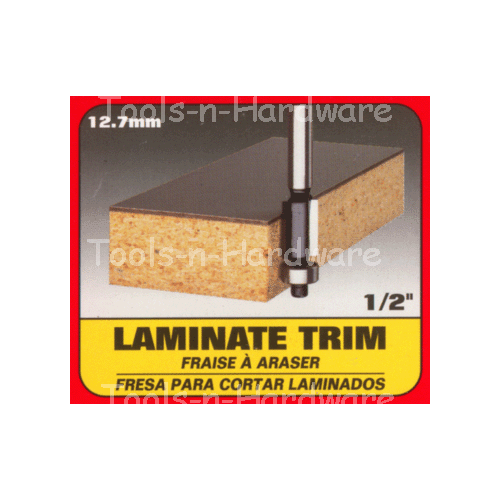
The straight cutter and the ball-bearing tip have the same diameter. In this case; the bearing would ride on a guide-block, set below the cut-area.. that establishes the desired depth of cut. (make sure that each cut is 1/2 of the total width increase intended) There is a special small router made expressly for laminate-trimming.. that should work very well for this application. It's made to be held with one hand during use.. and is much lighter in weight than a general purpose woodworking router. Finish-Carpenters will usually have one. When Formica countertops were popular.. the laminate-trimming router saw a lot of use.
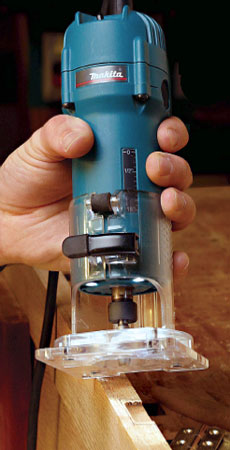
I wouldn't imagine needing to remove much material from each beam. A thin rigid plate (faux-doubler) could be clamped to the fuse, back far enough not to interfere with the router base, having been pre-cut (notched) to expose both beams area to be cut. Pre-gaged/guide-blocks (for the cutter's ball-bearing) could be possibly fastened to the underside (opposite side..) of the beams via wood-screws in the existing beam holes.. as long as there's clearance for the cutter. This method would quickly trim both beams in one set-up.. and provide a solid surface for the router base to achieve a perpendicular cut. Be sure to feed the cutter in the correct directions. One side will require an "inward" feed and the other will require an "outward" feed.
Edit: The plate for the router base to slide on, may need to be notched on the backside, for landing gear legs.. and also shimmed on the backside; rearward of any ply-doublers..to match their thickness, so that the plate lays flat on the side of the fuse when clamped.
"Shaving" the insides of the beams using a router would square the cut much better than any saw would. The router bit that Ken speaks of, I believe is referred to as a laminate-trimmer. This one pictured below has a 1/2"L. cutter.. but they are available in longer lengths of cut.

The straight cutter and the ball-bearing tip have the same diameter. In this case; the bearing would ride on a guide-block, set below the cut-area.. that establishes the desired depth of cut. (make sure that each cut is 1/2 of the total width increase intended) There is a special small router made expressly for laminate-trimming.. that should work very well for this application. It's made to be held with one hand during use.. and is much lighter in weight than a general purpose woodworking router. Finish-Carpenters will usually have one. When Formica countertops were popular.. the laminate-trimming router saw a lot of use.

I wouldn't imagine needing to remove much material from each beam. A thin rigid plate (faux-doubler) could be clamped to the fuse, back far enough not to interfere with the router base, having been pre-cut (notched) to expose both beams area to be cut. Pre-gaged/guide-blocks (for the cutter's ball-bearing) could be possibly fastened to the underside (opposite side..) of the beams via wood-screws in the existing beam holes.. as long as there's clearance for the cutter. This method would quickly trim both beams in one set-up.. and provide a solid surface for the router base to achieve a perpendicular cut. Be sure to feed the cutter in the correct directions. One side will require an "inward" feed and the other will require an "outward" feed.
Edit: The plate for the router base to slide on, may need to be notched on the backside, for landing gear legs.. and also shimmed on the backside; rearward of any ply-doublers..to match their thickness, so that the plate lays flat on the side of the fuse when clamped.
 Re: Narrowing engine bearers
Re: Narrowing engine bearers
All the router ideas got me thinking. I have three routers - small to very large - but I think I would have trouble using any of them as described.
I have just finished a staircase by trimming the spindles with my smallest router (actually it isn't my smallest I have a few Dremel sized but they aren't for bits more than 1/8").
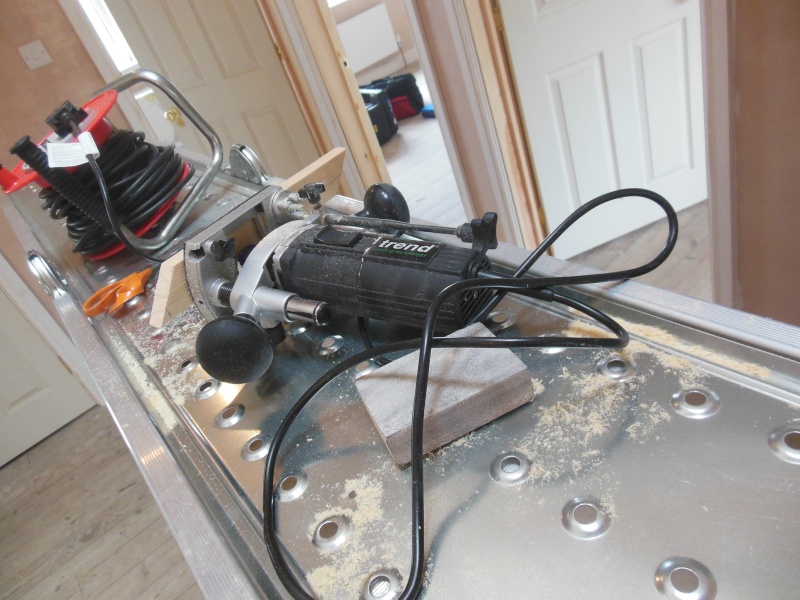


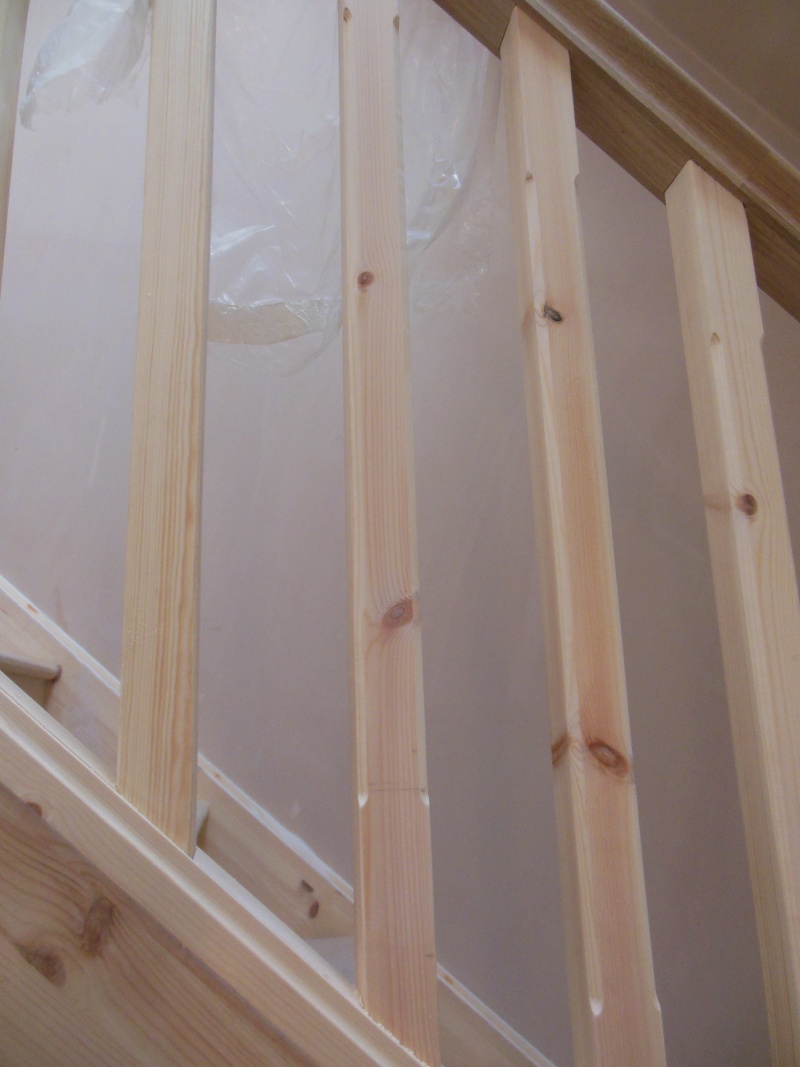
The problem I see with using a router as suggested is that the end cut will be rounded (the point of entry or exit of the bit nearest the fuselage.)
Also, the distance from the spinning bit to the router base is a couple of inches. If this model is one of those silhouetty things - then it shouldn't be a problem unless the wing is attached. The base of the router would clash with the wing.
Worse problems would occur with the router table. The distance between the bit and the edge of the table is considerably greater. The plane would have to have a very long nose or the fuselage (slabby thing) detached from the wing.
The spindles pictured show the rounded entry and exit from the chamfer. I made a jig so that the chamfers were of equal length but the cuts would have been much longer before the base fouled the handrail or the base.
However, all is not lost - provided you have a large router, a 1/2" straight bit four to six inches long and a router table with a fence.
Make a right angle jig to hold the plane nose down on the table. Set the bit to the required height - adjust the cutting distance using the fence - and then make a pass through.
The resulting cut (notch in the old bearers would then be at 90deg to the fuselage sides and have a square corner for butting the new bearer material to.
Let us see - Jessum table with Router lift - $500, 1/2" tungsten carbide bit - $15, Dewalt 1/2" Router $300 and for supreme accuracy - INCRA Wonder fence with right angled jig - $400.
A mere $1,215.
As opposed to - Dovetail Saw $15.
Then again an overhead CNC router cuts to the edge of the table.
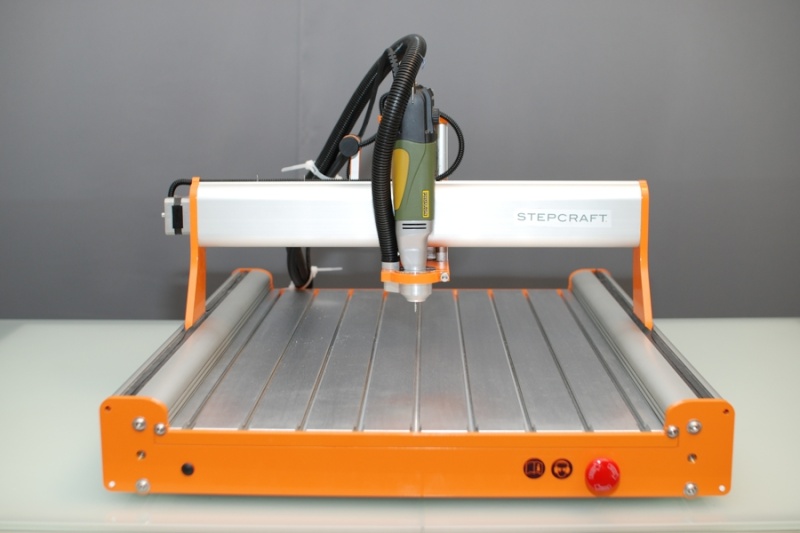
but this model would need a few passes - largest bit size is 3mm. But alas, this is not cheap and needs a PC, CNC controller and software!
I have just finished a staircase by trimming the spindles with my smallest router (actually it isn't my smallest I have a few Dremel sized but they aren't for bits more than 1/8").




The problem I see with using a router as suggested is that the end cut will be rounded (the point of entry or exit of the bit nearest the fuselage.)
Also, the distance from the spinning bit to the router base is a couple of inches. If this model is one of those silhouetty things - then it shouldn't be a problem unless the wing is attached. The base of the router would clash with the wing.
Worse problems would occur with the router table. The distance between the bit and the edge of the table is considerably greater. The plane would have to have a very long nose or the fuselage (slabby thing) detached from the wing.
The spindles pictured show the rounded entry and exit from the chamfer. I made a jig so that the chamfers were of equal length but the cuts would have been much longer before the base fouled the handrail or the base.
However, all is not lost - provided you have a large router, a 1/2" straight bit four to six inches long and a router table with a fence.
Make a right angle jig to hold the plane nose down on the table. Set the bit to the required height - adjust the cutting distance using the fence - and then make a pass through.
The resulting cut (notch in the old bearers would then be at 90deg to the fuselage sides and have a square corner for butting the new bearer material to.
Let us see - Jessum table with Router lift - $500, 1/2" tungsten carbide bit - $15, Dewalt 1/2" Router $300 and for supreme accuracy - INCRA Wonder fence with right angled jig - $400.
A mere $1,215.
As opposed to - Dovetail Saw $15.
Then again an overhead CNC router cuts to the edge of the table.

but this model would need a few passes - largest bit size is 3mm. But alas, this is not cheap and needs a PC, CNC controller and software!

ian1954- Diamond Member

- Posts : 2688
Join date : 2011-11-16
Age : 70
Location : England
 Changing beam spacing
Changing beam spacing
Yikes, talk about overkill!
Glue a piece of 50 grit sandpaper to a 1/2" X 2" piece of scrap wood and just sand off enough that you could instant glue a small section of birch ply to each beam.
No need for a router IMO.
Glue a piece of 50 grit sandpaper to a 1/2" X 2" piece of scrap wood and just sand off enough that you could instant glue a small section of birch ply to each beam.
No need for a router IMO.

706jim- Gold Member

- Posts : 472
Join date : 2013-11-29
 Profile fuse beam mounts
Profile fuse beam mounts
Here's a dremel-tool w/Router attachment.. and a Jr. Ring fuse. A thin-wide plate between the two, w/guide-rail(s) for the router-base, would do the job when clamped to the fuse. Easy and accurate. May require two passes for reaching final depth though.
Like Ian mentioned; cut your new bearers.. glue them on and pin them. I would think that pairs of 1/8" hardwood dowels each side near the opposing ends, should provide adequate shear strength. You won't be able to drill straight-in.. but even slightly angled; they'll serve their purpose. Maybe alternating the pin-angles by drilling from opposing sides, might help prevent splitting along the grain?
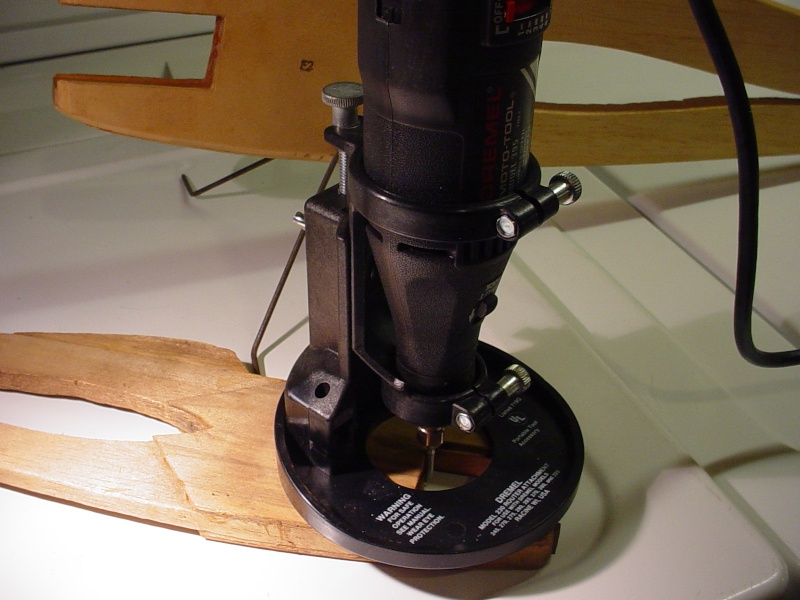
Like Ian mentioned; cut your new bearers.. glue them on and pin them. I would think that pairs of 1/8" hardwood dowels each side near the opposing ends, should provide adequate shear strength. You won't be able to drill straight-in.. but even slightly angled; they'll serve their purpose. Maybe alternating the pin-angles by drilling from opposing sides, might help prevent splitting along the grain?

 Similar topics
Similar topics» Extending engine bearers?
» Making aluminum engine bearers
» **Black Lynx Engine Giveaway June 2017** Cox Engine of the Month
» **Black Lynx Engine Giveaway June 2019** Cox Engine of the Month
» **Black Lynx Engine Giveaway Jan-June 2022** Cox Engine of the Month
» Making aluminum engine bearers
» **Black Lynx Engine Giveaway June 2017** Cox Engine of the Month
» **Black Lynx Engine Giveaway June 2019** Cox Engine of the Month
» **Black Lynx Engine Giveaway Jan-June 2022** Cox Engine of the Month
Page 1 of 1
Permissions in this forum:
You cannot reply to topics in this forum

 Rules
Rules






